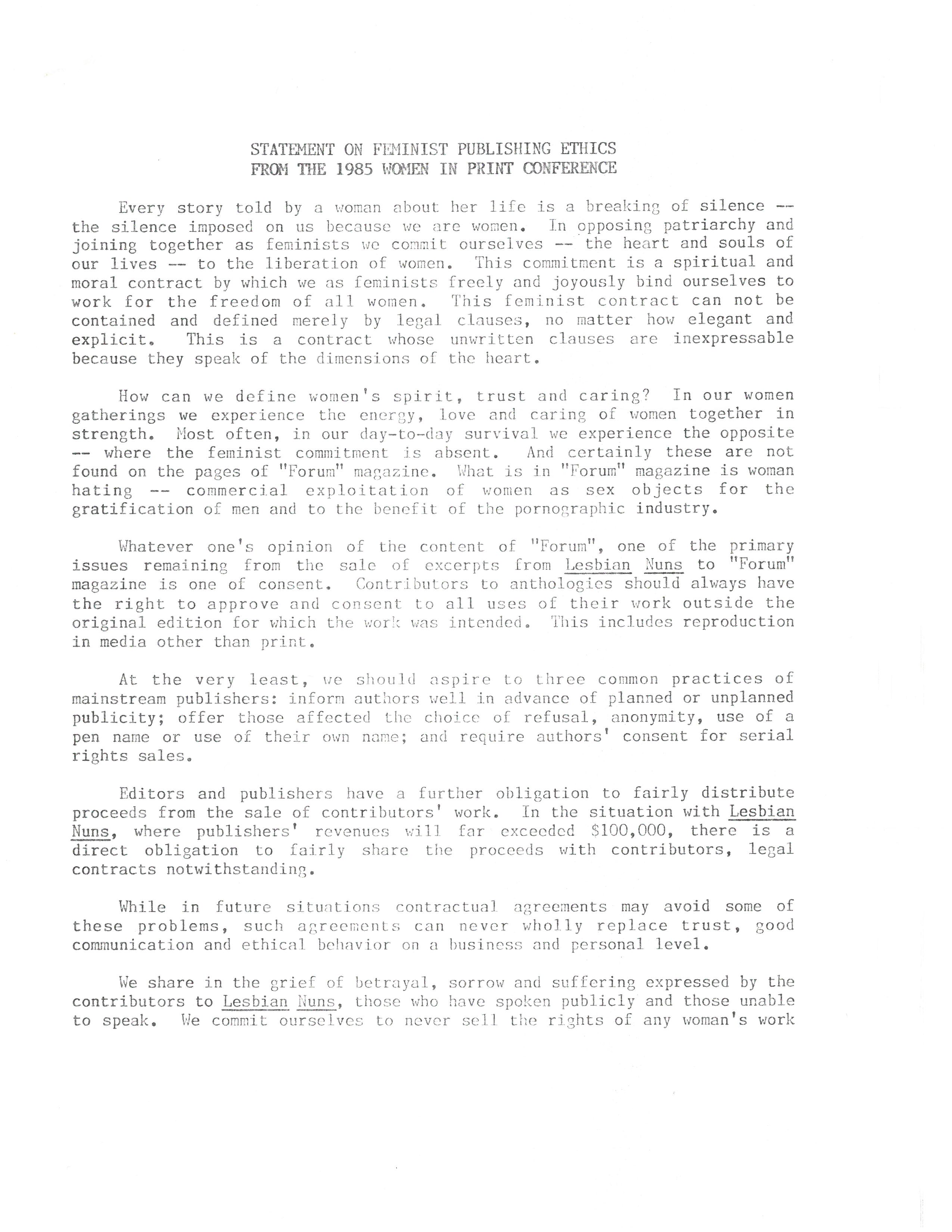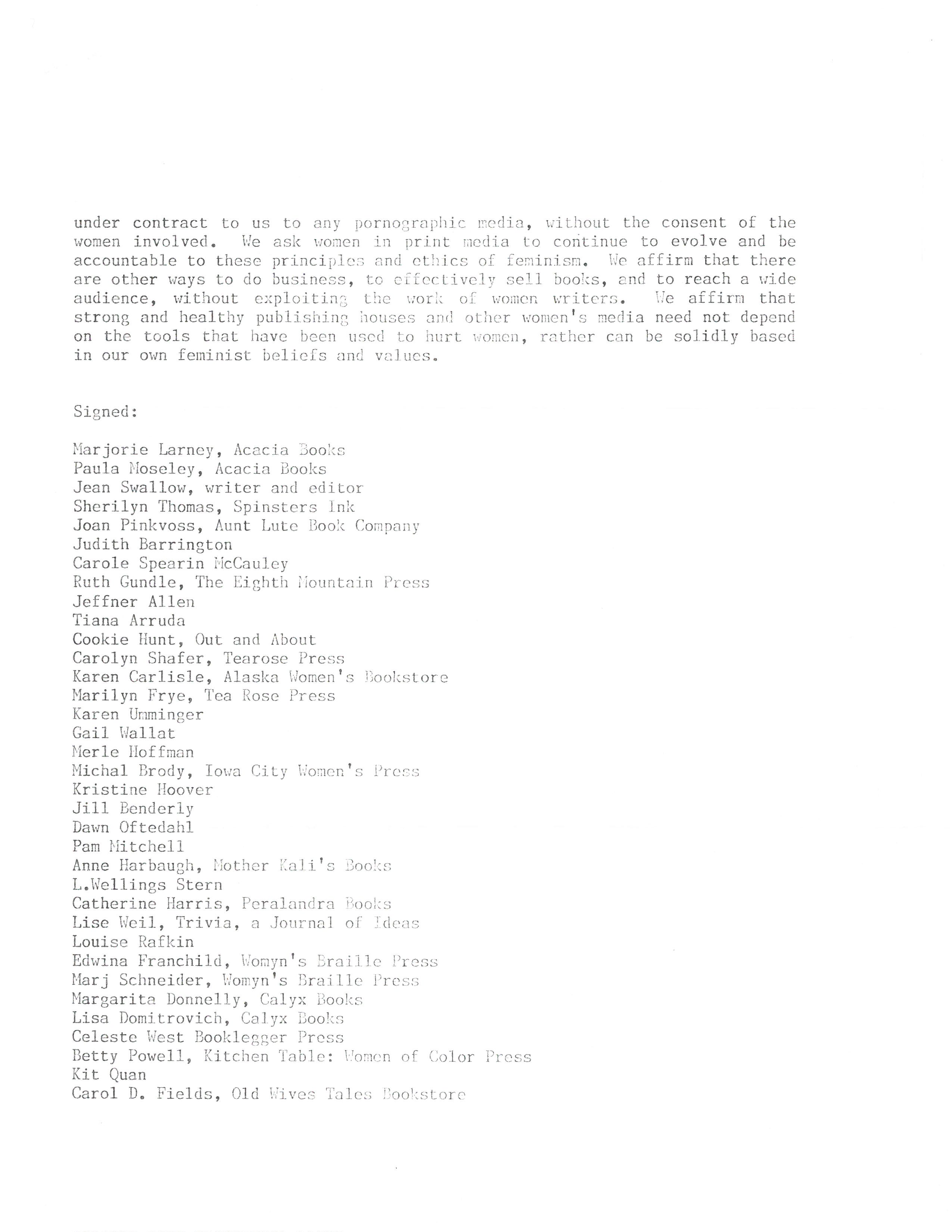|
|
Transcription: Statement of Feminist Publishing Ethics From the 1985 Women in Print Conference Every story told by a woman about her life is a breaking of silence — the silence imposed on us because we are women. In opposing patriarchy and joining together as feminists we commit ourselves — the heart and souls of our lives — to the liberation of women. This commitment is a spiritual and moral contract by which we as feminists freely and joyously bind ourselves to work for the freedom of all women. This feminist contract can not be contained and defined merely by legal clauses, no matter how elegant and explicit. This is a contract whose unwritten clauses are inexpressible because they speak of the dimensions of the heart. How can we define women’s spirit, trust, and caring? In our women gatherings we experience the energy, love and caring of women together in strength. Most often, in our day-to-day survival we experience the opposite — where the feminist commitment is absent. And certainly these are not found on the pages of “Forum” magazine.[1] What is in “Forum” magazine is woman hating — commercial exploitation of women as sex objects for the gratification of men and to the benefit of the pornographic industry. Whatever one’s opinion of the content of “Forum,” one of the primary issues remaining from the sale of excerpts from Lesbian Nuns to “Forum” magazine is one of consent. Contributors to anthologies should always have the right to approve and consent to all uses of their work outside the original edition for which the work was intended. This includes reproduction in media other than print. At the very least, we should aspire to three common practices of mainstream publishers: inform authors well in advance of planned or unplanned publicity; offer those affected the choice of refusal, anonymity, use of a pen name or use of their own name; and require authors’ consent for serial rights sales. Editors and publishers have a further obligation to fairly distribute proceeds from the sales of contributors’ work. In the situation with Lesbian Nuns, where publishers’ revenues will far exceeded [sic] $100,000, there is a direct obligation to fairly share the proceeds with contributors, legal contracts notwithstanding. While in future situations contractual agreements may avoid some of these problems, such agreements can never wholly replace trust, good communication and ethical behavior on a business and personal level. We share in the grief of betrayal, sorrow, and suffering expressed by the contributors to Lesbian Nuns, those who have spoken publicly and those unable to speak. We commit ourselves to never sell the rights of any women’s works under contract to us to any pornographic media, without the consent of the women involved. We ask women in print media to continue to evolve and be accountable to these principles and ethics of feminism. We affirm that there are other ways to do business, to effectively sell books, and to reach a wide audience, without exploiting the work of women writers. We affirm that strong and healthy publishing houses and other women’s media need not depend on the tools that have been used to hurt women, rather can be solidly based in our own feminist beliefs and values. Signed: Marjorie Larney, Acacia Books Paula Nosely, Acacia Books Jean Swallow, writer and editor [sic] Sherilyn Thomas, Spinsters Ink Judith Barrington Carole Spearin McCauley Ruth Gundle, The Eighth Mountain Press Jeffner Arrudo Cookie Hunt, Out and About Carolyn Shafer, Tearose Press [sic] Karen Carlisle, Alaska Women’s Bookstore Marilyn Frye, Tea Rose Press Karen Uminger Gail Wallat Merle Hoffman Michal Brody, Iowa City Women’s Press Kristine Hoover Jill Benderly Dawn Oftedahl Pam Mitchell Anne Harbaugh, Mother Kali’s Books
Catherine Harris, Peralandra Books Lise Weil, Trivia, a Journal of Ideas Louise Rafkin Edwina Franchild, Womyn’s Braille Press Marj Schneider, Womyn’s Braille Press Margarita Donnelly, Calyx Books Lisa Domitrovich, Calyx Books Celeste West, Booklegger Press Betty Powell, Kitchen Table: Women of Color Press Kit Quan Carol D. Fields, Old Wives Tales Bookstore Transcribed by Sophia Pekowsky |
[1] Penthouse Forum, often referred to as Forum Magazine, was started in March 1970 as a supplement to Penthouse, a pornographic magazine targeted towards men.

